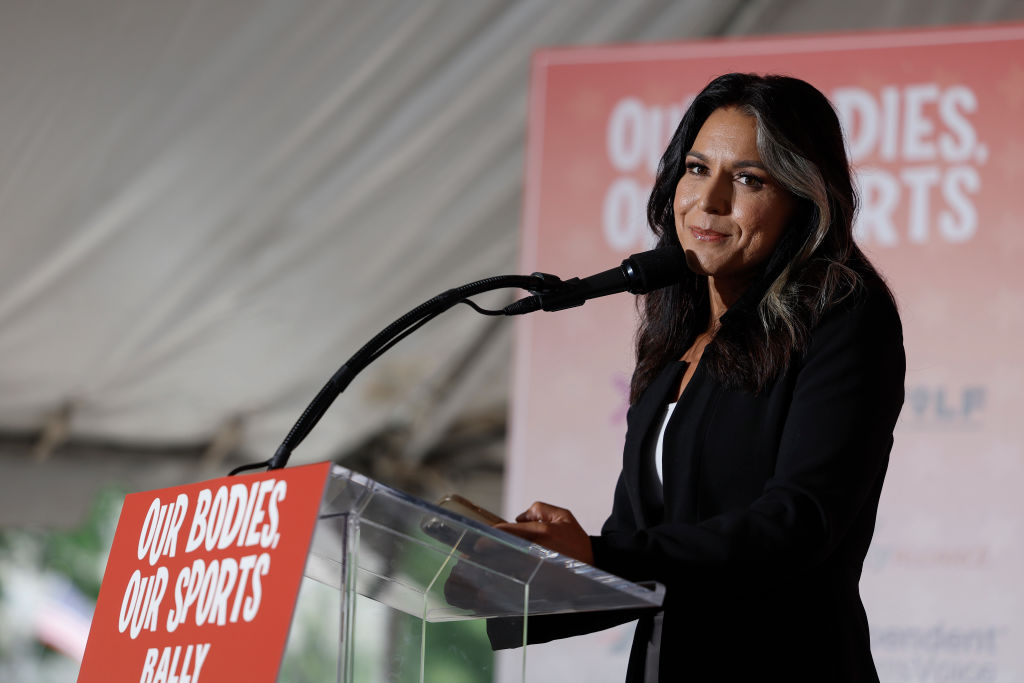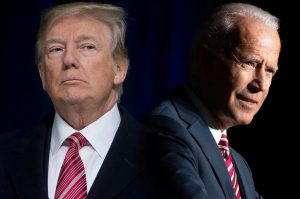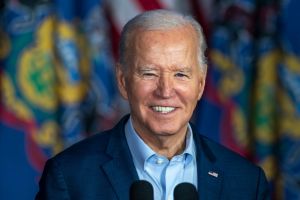Tulsi Gabbard has been a de facto outsider within the Democratic Party for a long time. Now, she’s finally made it official, leaving the party she served first in the Hawaii State House and then in Congress for eight years. Tulsi also announced a new Substack and a podcast as her next moves.
Gabbard’s path to this moment was marked by fascinating developments within the culture wars that came to characterize the Obama-Biden era of the Democratic Party. Once viewed as a rising star within the ranks — she was the first Hindu woman and the first female combat veteran in Congress — she was unanimously elected as vice chair of the party in 2013. But her clashes with Democratic National Committee chair Debbie Wasserman Schultz over the DNC’s perceived (and, as we know now in part thanks to WikiLeaks, accurate) embrace of Hillary Clinton in the presidential primary ultimately led to Gabbard resigning from her role to endorse Bernie Sanders in 2016.
At the time, few would have foreseen that Gabbard would be accused of being a stalking horse for Republicanism within Democratic ranks. As someone who entered politics as an environmentalist, she came off initially as more of an anti-war Democratic Socialist with concerns that the Democrats were embracing neoliberal globalism instead of the concerns of working people. Back then, she seemed more Squad-adjacent than likely to end up as Joe Rogan’s favorite politician.
So what changed? Two major expressions of her views in 2019 indicate how the Democratic Party and Gabbard grew apart. The first was a surprising op-ed she published in the Hill in January 2019, directing pointed criticism at Senate Democrats, including Judiciary chair Dianne Feinstein, over the imposition of religious tests on judicial nominees — and in particular for membership in the Knights of Columbus. Invoking JFK, Al Smith and the Catholic tests faced by Democrats in the past, Gabbard’s op-ed was widely shared by religious groups of a conservative bent. It was interpreted as a criticism of Senators Kamala Harris and Mazie Hirono, both of whom had recently raised the issue of a nominee’s membership in the Knights as possibly barring him from approval. The nominee, Brian Buescher, was ultimately approved on a party-line vote.
The second expression of her views came in a more prominent forum. It’s easy to forget that in the early days of the Democratic primary fights, Kamala Harris was establishing herself as a major contender for the presidential nomination. The speech and event launching her candidacy were superb, and she took the fight on race directly to Joe Biden in the first Democratic debate. But at a debate the following month in Detroit, Gabbard singlehandedly destroyed Harris onstage for her “tough on crime” record on law enforcement in California, saying:
Senator Harris says she’s proud of her record as a prosecutor and that she’ll be a prosecutor president. But I’m deeply concerned about this record. There are too many examples to cite but she put over 1,500 people in jail for marijuana violations and then laughed about it when she was asked if she ever smoked marijuana.
She blocked evidence — she blocked evidence that would have freed an innocent man from death row until the courts forced her to do so. She kept people in prison beyond their sentences to use them as cheap labor for the state of California.
In the wake of the debate, Harris was absolutely rattled. On CNN afterward, she invoked her status as a “top tier candidate” to explain away the drubbing. But the damage was done: Harris spiraled into single digits, and dropped out of the race before a single vote was tallied.
Much of Gabbard’s critique of both parties has been on issues of foreign policy, which has drawn attention thanks to her military background and combat experience. She was twenty on 9/11, and is part of a generation marked by the experiences of Iraq and Afghanistan. Mitt Romney even called her a traitor, something she told me she took very personally.
But these two incidents in 2019, paired with the culturally focused content of her first podcast’s critiques of the Democratic ideas coalition — criticizing everyone from Robin DiAngelo to Rachel Levine to the “cultural Marxists” running Black Lives Matter — show there’s a lot more going on with Gabbard than just the anti-Hillary Clinton positioning that once defined her. She represents more than just a break with the neoliberalism of today’s Democrats. She represents a path not taken in American politics — at least, not yet.


















